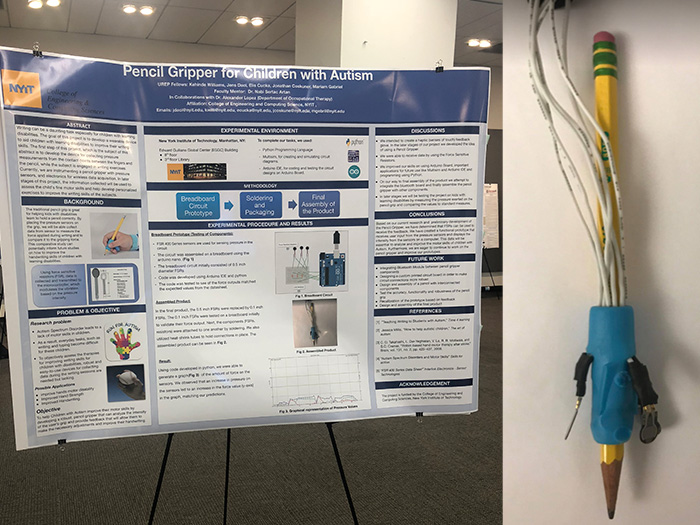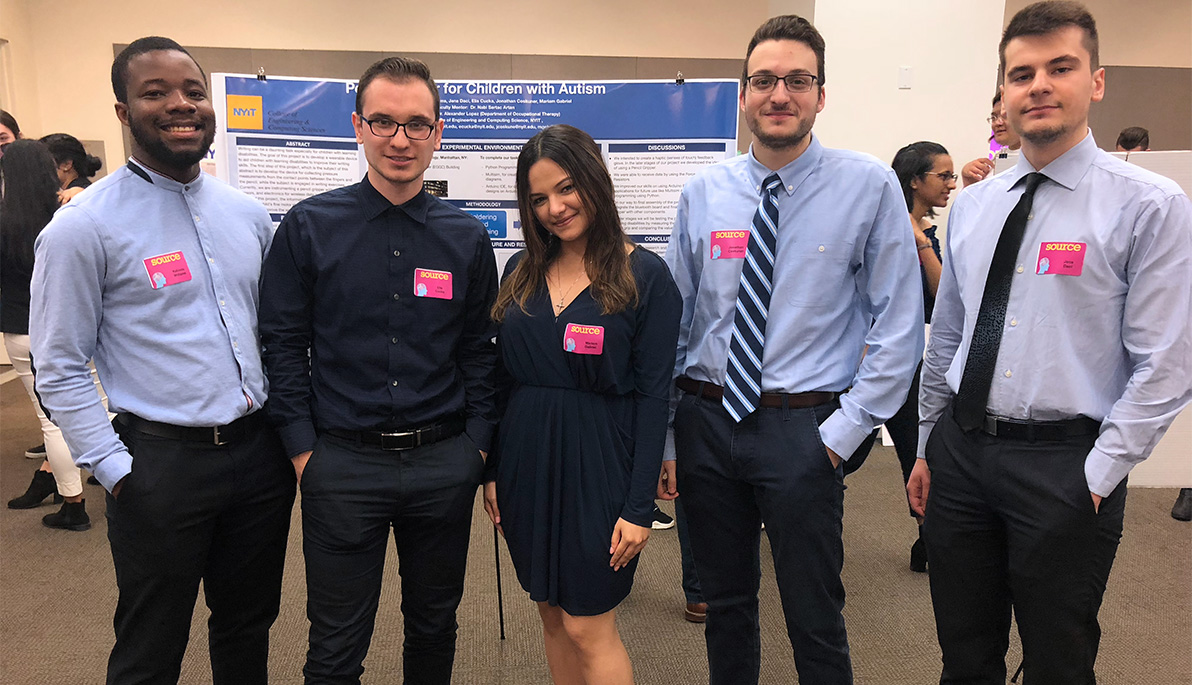News
Pencils Up: Student Research Helps Children With Autism
April 29, 2019
Pictured from left: Kehinde Oluwanifemi Williams, Elis Cucka, Mariam Gabriel, Jonathan Coskuner, and Jens Daci.
National Autism Awareness Month was created to assure that each person with Autism Spectrum Disorder (ASD) “is provided the opportunity to achieve the highest possible quality of life.” NYIT College of Engineering and Computing Sciences students—Kehinde Oluwanifemi Williams, Jens Daci, Elis Cucka, Jonathan Coskuner, and NYIT College of Arts and Sciences student Mariam Gabriel—are contributing to this goal with their research project, Pencil Gripper for Children With Autism.
The team is just one of more than a dozen Undergraduate Research and Entrepreneurship Program (UREP) teams working on projects this semester. UREP gives undergraduate students the opportunity to do research or entrepreneurship projects under the guidance of faculty mentors.
The pencil gripper team is being mentored by Assistant Professor Nabi Sertac Artan, Ph.D. His research focus is on hardware design for biomedical devices and for security applications. His current biomedical device design projects include wireless transcutaneous (through-skin) power transfer to implantable biomedical devices, VLSI circuit design for biomedical data acquisition, low-power algorithms for detecting epileptic seizures, and embedded system design for assistive medical devices for patients with Parkinson’s disease.
Along with sharing his expertise in the area of biomedical devices, Artan taught the team important lessons about completing research. “Working on this project taught me about research in terms of gathering data, utilizing work that’s already in the field, and the value of having a mentor. Dr. Artan helped us work as a team and taught us the importance of time management because we had critical deadlines,” said Williams.

The pencil gripper is designed to collect and analyze data in order to assess the user’s fine motor skills and develop exercises to help them improve their writing skills.
Many people do not know that ASD affects the motor skills, which can make writing difficult. Guided by this knowledge and with the goal of informing future studies on how to improve the handwriting skills of children with learning disabilities, the team created a functional prototype for a pencil gripper that collects data from a sensor.
In the first stage of the project, the team developed a writing implement with sensors that collects pressure measurements while the subject is engaged in writing exercises. Later, the students plan to collect and analyze the data so they can assess the user’s fine motor skills and develop personalized exercises to help them improve their writing skills.
“This project allowed me to utilize Arduino and microcontrollers, [which is] something I’m interested in. I want to work in the field of embedded software. Working with Arduino was a helpful professional experience that will keep me on track with my goals,” said Williams.
Alexander Lopez, J.D., associate professor and interim chair of the NYIT School of Health Professions’ Department of Occupational Therapy is also helping the team. Lopez has more than 15 years of clinical experience working with children with an array of medical and developmental conditions, and his research addresses motor learning and control impairments in children with an autism spectrum disorder. He is also the founder and CEO of a nonprofit organization that serves children with motor and cognitive impairments.
“The [UREP team] is at the forefront of designing a unique, practical, and attractive solution for children with functional impairments that affect their overall academic performance,” he says. “I can provide [the team] consultation on the sensorimotor impairments associated with dysgraphia (the learning disability that affects writing abilities).”
Artan’s research, in turn, focuses on hardware design for biomedical devices. Combined with Lopez’ background with working with children with disabilities, this expertise creates an ideal environment for the team to achieve their goal.





